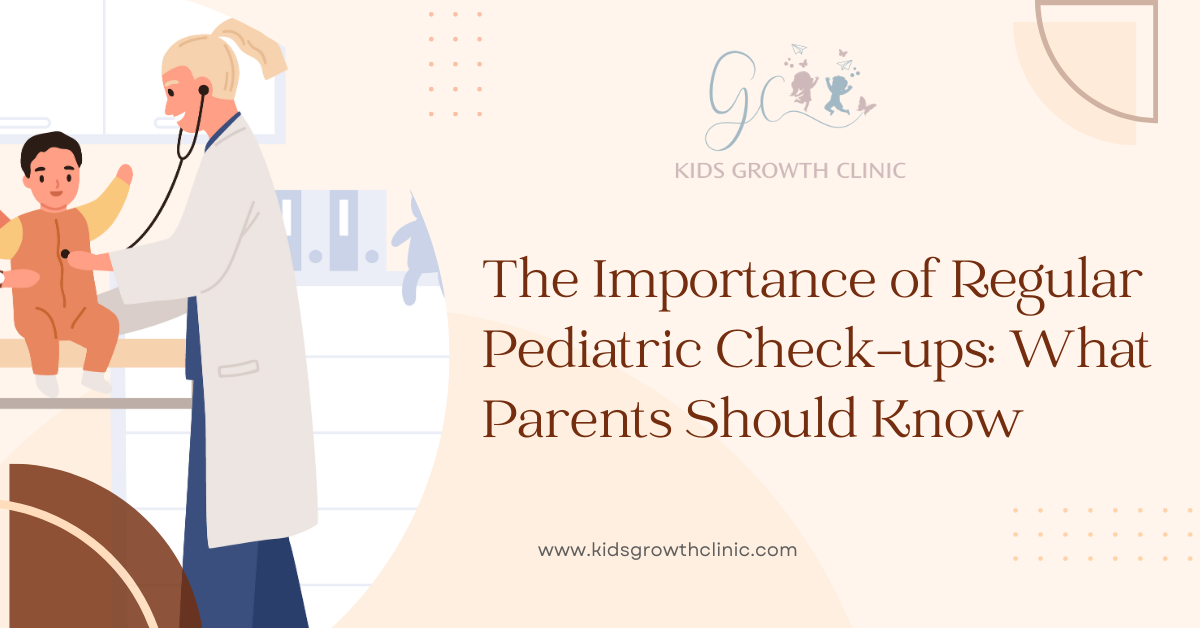Ensuring a child’s health is a top priority for every parent. Regular pediatric check-ups play a crucial role in tracking a child’s growth and development, providing preventive care, and ensuring early detection of potential health concerns. These well-child visits allow pediatricians to monitor key developmental milestones, administer vaccinations, and address any concerns parents may have.
This article explores the importance of regular pediatric check-ups, offering vital insights that parents should know to ensure their child’s overall health and well-being.

Why Are Regular Pediatric Check-ups Essential?
Routine check-ups are crucial for ensuring that a child is developing appropriately. They serve multiple purposes:
- Monitor your child’s growth: Pediatricians track weight, height, and head circumference to ensure proper development.
- Early detection of health concerns: Identifying developmental delays or other health issues early helps in timely intervention.
- Preventive care: Regular visits to a pediatrician include screenings, immunization, and discussions about maintaining healthy habits.
- Parental guidance: These visits are also an opportunity for parents to ask questions about diet, sleep, behavior, and safety.
What Happens During a Pediatric Check-up?
A pediatric check-up typically includes:
- Physical examination: Assessing reflexes, motor skills, and child’s physical health.
- Developmental screenings: Identifying developmental milestones related to speech, movement, and social skills.
- Vision and hearing tests: Checking for early signs of issues.
- Vaccinations and immunization updates: Ensuring the child is protected against diseases like measles.
- Parental counseling: Addressing concerns about feeding, sleep routines, and behavioral changes.
How Often Should a Child Have a Well-Child Visit?
The American Academy of Pediatrics recommends frequent well-child visits in the first year of life, followed by annual check-ups thereafter. The schedule typically includes:
- Infancy: Newborn, 1 month, 2 months, 4 months, 6 months, 9 months.
- Toddler years: 12, 15, 18, and 24 months.
- Preschool and school-age: Annually from ages 3 to 18.
Each stage of development presents different challenges, making regular check-ups essential for ensuring proper health and well-being.
The Role of Vaccinations in Pediatric Care
Vaccination is a key part of pediatric care that prevents severe childhood illnesses. According to the Centers for Disease Control, vaccines protect against:
- Measles, mumps, rubella (MMR)
- Polio
- Hepatitis A & B
- Diphtheria, tetanus, and whooping cough (DTaP)
- Chickenpox and pneumonia
A child’s vaccination schedule should be followed to avoid preventable diseases. Skipping vaccines increases the risk of outbreaks and serious health complications.
Early Detection of Health Concerns Through Check-ups
One of the primary benefits of regular pediatric check-ups is the early detection of potential health problems. Pediatricians assess:
- Growth abnormalities: Delays in developmental milestones like walking and talking.
- Hearing and vision problems: Early vision and hearing tests can prevent learning difficulties.
- Nutritional deficiencies: Lack of essential vitamins and minerals affecting child’s health and development.
Regular health check-ups help parents make informed decisions regarding diet, exercise, and overall wellness.
The Connection Between Check-ups and Long-Term Health
Annual visits to a pediatrician establish a foundation for long-term health. Early preventive care contributes to:
- Healthy habits: Teaching children about good hygiene practices and balanced nutrition.
- Preventing chronic conditions: Addressing obesity, asthma, and allergies before they escalate.
- Mental health support: Identifying signs of anxiety or behavioral challenges.
Emotional and Mental Well-being: A Crucial Aspect of Check-ups
A child’s mental health and emotional well-being are just as important as their physical health. Pediatricians evaluate:
- Social behavior and emotional responses
- Signs of anxiety or depression
- Cognitive development and learning abilities
Parents should know that mental health concerns can manifest as sleep disturbances, lack of concentration, or withdrawal from activities. Regular visits help identify issues early.
How Check-ups Help Monitor Your Child’s Growth
Children grow rapidly in their early years, making check-ups crucial for tracking:
- Weight and height progress
- Head circumference (especially in infants)
- Motor skills and coordination
By comparing these measurements with standard growth charts, pediatricians ensure that a child’s health journey is on track.
Vision and Hearing: An Important Part of Check-ups
Vision and hearing tests are an integral part of check-ups. Issues like nearsightedness or hearing impairments can hinder learning and communication.
Regular screenings detect:
- Hearing loss due to infections or genetic factors
- Vision problems that affect reading and focus
- Delays in speech due to hearing difficulties
Early detection of potential health issues ensures children receive the necessary support, whether through glasses, speech therapy, or other interventions.
How Parents Can Prepare for a Pediatric Check-up
To make the most of each pediatric check-up, parents should:
- Bring a list of concerns about diet, sleep, or behavior.
- Review the child’s medical history, including allergies and past illnesses.
- Discuss upcoming vaccines with the pediatrician.
Check-ups also provide an opportunity for parents to talk about their child’s emotional, physical, and cognitive developmental milestones.
Key Takeaways for Parents
- Regular pediatric check-ups are essential for monitoring growth and development.
- Check-ups and vaccinations play a vital role in preventing diseases.
- Early detection of potential health issues ensures timely treatment.
- Annual check-ups support both physical and emotional well-being.
- Parents may use these visits as an opportunity to discuss health concerns.
- Maintaining a consistent check-up schedule ensures the best start in life for children.
Scheduling a pediatric check-up provides peace of mind and ensures compassionate care for a child’s health. If you haven’t already, schedule an appointment with a trusted pediatrician today.


